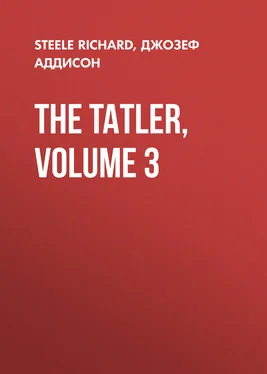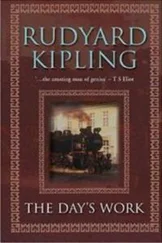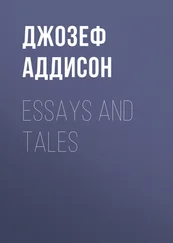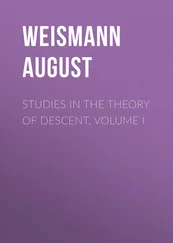Джозеф Аддисон - The Tatler, Volume 3
Здесь есть возможность читать онлайн «Джозеф Аддисон - The Tatler, Volume 3» — ознакомительный отрывок электронной книги совершенно бесплатно, а после прочтения отрывка купить полную версию. В некоторых случаях можно слушать аудио, скачать через торрент в формате fb2 и присутствует краткое содержание. Жанр: foreign_prose, foreign_antique, на английском языке. Описание произведения, (предисловие) а так же отзывы посетителей доступны на портале библиотеки ЛибКат.
- Название:The Tatler, Volume 3
- Автор:
- Жанр:
- Год:неизвестен
- ISBN:нет данных
- Рейтинг книги:4 / 5. Голосов: 1
-
Избранное:Добавить в избранное
- Отзывы:
-
Ваша оценка:
- 80
- 1
- 2
- 3
- 4
- 5
The Tatler, Volume 3: краткое содержание, описание и аннотация
Предлагаем к чтению аннотацию, описание, краткое содержание или предисловие (зависит от того, что написал сам автор книги «The Tatler, Volume 3»). Если вы не нашли необходимую информацию о книге — напишите в комментариях, мы постараемся отыскать её.
The Tatler, Volume 3 — читать онлайн ознакомительный отрывок
Ниже представлен текст книги, разбитый по страницам. Система сохранения места последней прочитанной страницы, позволяет с удобством читать онлайн бесплатно книгу «The Tatler, Volume 3», без необходимости каждый раз заново искать на чём Вы остановились. Поставьте закладку, и сможете в любой момент перейти на страницу, на которой закончили чтение.
Интервал:
Закладка:
I was so incensed by the tortures of my innocent domestic, and the unworthy dealings of these men, that I told them, if each of them had as many lives as the injured creature before them, they deserved to forfeit them for the pernicious arts which they used for their profit. I therefore bid them look upon themselves as no better than as a kind of assassins and murderers within the law. However, since they had dealt so clearly with me, and laid before me their whole practice, I dismissed them for that time; with a particular request, that they would not poison any of my friends and acquaintance, and take to some honest livelihood without loss of time.
For my own part, I have resolved hereafter to be very careful in my liquors, and have agreed with a friend of mine in the army, upon their next march, to secure me two hogsheads of the best stomach-wine in the cellars of Versailles, for the good of my Lucubrations, and the comfort of my old age.
No. 132
Habeo senectuti magnam gratiam, quæ mihi sermonis aviditatem auxit, potionis et cibi sustulit.—Cicero, De Sen. 46.
After having applied my mind with more than ordinary attention to my studies, it is my usual custom to relax and unbend it in the conversation of such as are rather easy than shining companions. This I find particularly necessary for me before I retire to rest, in order to draw my slumbers upon me by degrees, and fall asleep insensibly. This is the particular use I make of a set of heavy honest men, with whom I have passed many hours, with much indolence, though not with great pleasure. Their conversation is a kind of preparative for sleep: it takes the mind down from its abstractions, leads it into the familiar traces 80 80 Paths.
of thought, and lulls it into that state of tranquillity, which is the condition of a thinking man when he is but half awake. After this, my reader will not be surprised to hear the account which I am about to give of a club of my own contemporaries, among whom I pass two or three hours every evening. This I look upon as taking my first nap before I go to bed. The truth of it is, I should think myself unjust to posterity, as well as to the society at the Trumpet, 81 81 The Trumpet stood about half-way up Shire Lane, between Temple Bar and Carey Street, at the widest and best part of the lane, and remained almost entirely in its original state until demolished to make way for the new Law Courts. It had the old sign of the Trumpet to the last, as it is figured in Limbard's "Mirror," in a picture where it is placed side by side with a view of the house in Fulwood's Rents where papers for the Spectator were taken in.
of which I am a member, did not I in some part of my writings give an account of the persons among whom I have passed almost a sixth part of my time for these last forty years. Our club consisted originally of fifteen; but partly by the severity of the law in arbitrary times, and partly by the natural effects of old age, we are at present reduced to a third part of that number: in which however we have this consolation, that the best company is said to consist of five persons. I must confess, besides the aforementioned benefit which I meet with in the conversation of this select society, I am not the less pleased with the company, in that I find myself the greatest wit among them, and am heard as their oracle in all points of learning and difficulty.
Sir Jeoffrey Notch, who is the oldest of the club, has been in possession of the right-hand chair time out of mind, and is the only man among us that has the liberty of stirring the fire. This our foreman is a gentleman of an ancient family, that came to a great estate some years before he had discretion, and run it out in hounds, horses, and cock-fighting; for which reason he looks upon himself as an honest worthy gentleman who has had misfortunes in the world, and calls every thriving man a pitiful upstart.
Major Matchlock is the next senior, who served in the last civil wars, and has all the battles by heart. He does not think any action in Europe worth talking of since the fight of Marston Moor; 82 82 July 2, 1644.
and every night tells us of his having been knocked off his horse at the rising of the London apprentices; 83 83 In July 1647 the London apprentices presented a petition, and forced their way into the House of Commons.
for which he is in great esteem amongst us.
Honest old Dick Reptile is the third of our society: he is a good-natured indolent man, who speaks little himself, but laughs at our jokes, and brings his young nephew along with him, a youth of eighteen years old, to show him good company, and give him a taste of the world. This young fellow sits generally silent; but whenever he opens his mouth, or laughs at anything that passes, he is constantly told by his uncle, after a jocular manner, "Ay, ay, Jack, you young men think us fools; but we old men know you are." 84 84 This retort, in almost identical words, occurs in Swift's "Genteel Conversation" (1739), and in Defoe's "Life of Duncan Campbell" (1720).
The greatest wit of our company, next to myself, is a bencher of the neighbouring inn, who in his youth frequented the ordinaries about Charing Cross, and pretends to have been intimate with Jack Ogle. 85 85 Jack Ogle, said to have been descended from a decent family in Devonshire, was a man of some genius and great extravagance, but rather artful than witty. Ogle had an only sister, more beautiful, it is said, than was necessary to arrive, as she did, at the honour of being a mistress to the Duke of York. This sister Ogle laid under very frequent contributions to supply his wants and support his extravagance. It is said that, by the interest of her royal keeper, Ogle was placed, as a private gentleman, in the first troop of foot guards, at that time under the command of the Duke of Monmouth. To this era of Ogle's life the story of the red petticoat refers. He had pawned his trooper's cloak, and to save appearances at a review, had borrowed his landlady's red petticoat, which he carried rolled up en croupe behind him. The Duke of Monmouth "smoked" it, and willing to enjoy the confusion of a detection, gave order to "cloak all," with which Ogle, after some hesitation, was obliged to comply; although he could not cloak, he said he would petticoat with the best of them. Such as are curious to know more of the history, the duels, and odd pranks of this mad fellow, may consult the account of them in the "Memoirs of Gamesters," 1714, 12mo, p. 183 (Nichols).
He has about ten distichs of "Hudibras" without book, and never leaves the club till he has applied them all. If any modern wit be mentioned, or any town frolic spoken of, he shakes his head at the dulness of the present age, and tells us a story of Jack Ogle.
For my own part, I am esteemed among them, because they see I am something respected by others, though at the same time I understand by their behaviour, that I am considered by them as a man of a great deal of learning, but no knowledge of the world; insomuch that the Major sometimes, in the height of his military pride, calls me the philosopher: and Sir Jeoffrey no longer ago than last night, upon a dispute what day of the month it was then in Holland, pulled his pipe out of his mouth, and cried, "What does the scholar say to it?"
Our club meets precisely at six o'clock in the evening; but I did not come last night till half an hour after seven, by which means I escaped the battle of Naseby, which the Major usually begins at about three-quarters after six; I found also, that my good friend, the bencher, had already spent three of his distichs, and only waiting an opportunity to hear a sermon spoken of, that he might introduce the couplet where "a stick" rhymes to "ecclesiastic." 86 86 "When pulpit drum ecclesiastic Was beat with fist instead of a stick." —"Hudibras," Part I. c. i. line 10.
At my entrance into the room, they were naming a red petticoat and a cloak, by which I found that the bencher had been diverting them with a story of Jack Ogle.
Интервал:
Закладка:
Похожие книги на «The Tatler, Volume 3»
Представляем Вашему вниманию похожие книги на «The Tatler, Volume 3» списком для выбора. Мы отобрали схожую по названию и смыслу литературу в надежде предоставить читателям больше вариантов отыскать новые, интересные, ещё непрочитанные произведения.
Обсуждение, отзывы о книге «The Tatler, Volume 3» и просто собственные мнения читателей. Оставьте ваши комментарии, напишите, что Вы думаете о произведении, его смысле или главных героях. Укажите что конкретно понравилось, а что нет, и почему Вы так считаете.












